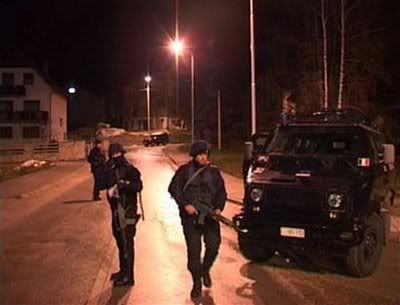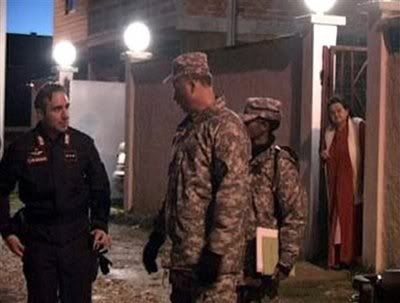THE HAGUE, The Netherlands (December 2,2008) - Under a decision made by judge Carmel Aguis, Chamber Chairman of the Tribunal at The Hague, the trial of Florence Hartmann, former spokeswoman of the Hague Prosecution, is due to start on February 5, 2009.
The trial will start with "a pre-trial conference" and the presentation of introductory arguments.
In August 2008 the International Criminal Tribunal for the former Yugoslavia, ICTY, charged Hartmann with contempt of Court, because she disclosed allegedly confidential data pertaining to the Appellate Chamber's decisions in the case of Serbian war criminal Slobodan Milosevic, in her book "Peace and Punishment", published in 2007, and an article on "Hidden Key Documents on Genocide" of 2008.
Hartmann has rejected the charges, arguing that she has not revealed confidential information, but only information she had gathered through her work as a journalist, and that her indictment represents a blow by the Office of the Prosecutor against free speech and transparency. She has pledged to fight the charges.
Hartmann is the first person without roots in the former Yugoslavia, and the first former ICTY official to be indicted by the Tribunal. As she points out, her book was published a year ago, making the delay in the issuing of her indictment peculiar. The charges refer to a case that is no longer actual, and cannot be motivated by any desire to ensure the proper functioning of the proceedings.
The indictment appears, indeed, to be an attempt to muzzle a whistleblower who has revealed information about the internal politics and incompetence within the Tribunal, and a warning to other former Tribunal officials who might be tempted to reveal more such information.
The ICTY is a highly flawed institution with a very patchy record; badly organised, filled with many incompetent apparatchiks alongside some committed professionals, riven with internal factionalism and corrupted by political pressures both external and self-induced, it has failed to deliver justice to the peoples of the former Yugoslavia.
The biggest criticism of it has been its failure to indict most of the principal Serbian,Montenegrin and Croatian war-criminals, a failure that, on the basis of my eyewitness experience, is attributed in large part to the poor strategy of del Ponte as Chief Prosecutor.
But a perhaps even more shameful failing on the Tribunal’s part was the one about which Florence writes: the decision of the judges in the Serbian war criminal Slobodan Milosevic case to allow the genocidal Serbia, when submitting to the Tribunal the minutes of the ‘Supreme Defence Council’ of the former Federal Republic of Yugoslavia, to censor parts of it in the version that was made public.
As Florence argues, it was thanks to the Tribunal’s collusion with Serbia in the suppression of this crucial piece of evidence, that Bosnia was not able to draw upon the latter in its case against Serbia for genocide at the International Court of Justice, leading to Serbia’s unjustified acquittal.
Far from punishing the perpetrators of genocide in Bosnia, the Tribunal has helped to shield them.To date, only one individual, a lowly deputy corps commander of the genocidal paramilitary formations of the Serbians living in Bosnia (VRS), has been successfully prosecuted for a genocide-related offence by the ICTY, while not a single official from genocidal Serbia has yet been convicted of any war-crime in Bosnia whatsoever).
The Tribunal may or may not have a legal case against Hartmann. What is certain, however, is that Hartmann was acting in the public interest in revealing the information she did. The people of the former Yugoslavia have a right to know why they have not received much in the way of justice from the ICTY, while the citizens of the world have a right to know why this UN court, funded by their taxes, has produced such poor results. Public interest would best be served if more former Tribunal officials showed as much principle and courage as Florence, and came forward with more insider information so that we can better understand this whole, sorry story. This would help to ensure that other international courts could avoid the ICTY’s mistakes.
Florence Hartmann is a brave, principled and committed individual who has done more than anyone to reveal the extent to which the international community and the international courts have betrayed the cause of justice for Bosnia, and her accusations of Western complicity in Serbian war criminal Radovan Karadzic’s evasion of arrest for thirteen years have been essentially vindicated.
Earlier this year, former Hague Tribunal insider has added her comments to claims that former leader and creator of the genocidal Serbian creature in Bosnia "RS" and one of the masterminds of the genocide against the Bosnian people,Serbian war criminal Radovan Karadžić enjoyed support from Britain,the United States,Russia and France.Hartmann told the Belgrade daily Blic that the UN war crimes court's prosecution on several occasions gave the U.S. exact locations where Serbian war criminal Radovan Karadzic was hiding. But, Hartmann says, "they did nothing".
"Information about the fugitives' whereabouts was abundant, however, it would always turn out that one of the three countries – the U.S., Britain or France – would block arrests," she said.
Also,according to Hartmann,Great Britain, USA and France purposefully left free former leader of the genocidal paramilitary fascist formations of the Serbians living in Bosnia (VRS),Serbian war criminal Ratko Mladic who is also wanted for genocide committed during the 1992-1995 Serbian aggression against Bosnia.
In March 2000, Hartmann says, the ICTY chief Prosecutor Carla del Ponte asked Wesley Clark, former NATO Supreme Allied Commander, whether the U.S. had a secret agreement with Serbian war criminal Karadzic. Clark in turn accused the French president Chirac of cutting a pact with (Serbian war criminals) Karadzic and Mladic to win the release of two French pilots held by the genocidal Serbian fascist formations for three months in 1995.
During the course of her appearance at the Court, on November 14, Hartmann refused to enter her plea so the Court recorded that "the indictee pleaded not guilty to both counts contained in the indictment".
As per the Tribunal's decision, the Prosecution and Defence are due to submit, to the Chamber, "their lists of witnesses", who will testify at the trial, as well as subjects on which they will speak, indicating also to which counts their statements would refer.
Both parties announced earlier that they would need "a day or a day and a half" for the presentation of evidence, including statements by witnesses and introduction of material evidence.
.
 LONDON, UK (December 5,2008) - The United Kingdom has reaffirmed its support to Bosnia'S aspirations to the membership of the European Union following the visit of Bosnian State Presidency member Dr.Haris Silajdzic to the UK.
LONDON, UK (December 5,2008) - The United Kingdom has reaffirmed its support to Bosnia'S aspirations to the membership of the European Union following the visit of Bosnian State Presidency member Dr.Haris Silajdzic to the UK.
















